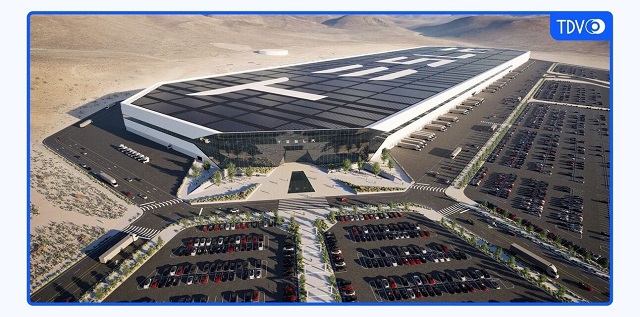Artificial Intelligence
Elon Musk is building the ‘most powerful Artificial Intelligence training cluster in the world’

News release from The Deep View
| Elon Musk’s xAI has ended talks with Oracle to rent more specialized Nvidia chips — in what could have been a $10 billion deal — according to The Information. |
| Musk is instead buying the chips himself, all to begin putting together his planned “gigafactory of compute.” |
| The details: Musk confirmed in a post on Twitter that xAI is now working to build the “gigafactory” internally. |
|
| xAI isn’t the only one trying to build a supercomputer; Microsoft and OpenAI, also according to The Information, have been working on plans for a $100 billion supercomputer nicknamed “Stargate.” |
| Why it matters: The industry is keen to pour more and more resources into the generation of abstractly more powerful AI models, and VC investments into AI companies, as we noted yesterday, are growing. |
| But at the same time, concerns about revenue and return on investment are growing as well, with a growing number of analysts gaining confidence in the idea that we are in a bubble of high costs and low returns, something that could be compounded by multi-billion-dollar supercomputers. |
Artificial Intelligence
Lawsuit Claims Google Secretly Used Gemini AI to Scan Private Gmail and Chat Data

Whether the claims are true or not, privacy in Google’s universe has long been less a right than a nostalgic illusion.
|
When Google flipped a digital switch in October 2025, few users noticed anything unusual.
Gmail loaded as usual, Chat messages zipped across screens, and Meet calls continued without interruption.
Yet, according to a new class action lawsuit, something significant had changed beneath the surface.
We obtained a copy of the lawsuit for you here.
Plaintiffs claim that Google silently activated its artificial intelligence system, Gemini, across its communication platforms, turning private conversations into raw material for machine analysis.
The lawsuit, filed by Thomas Thele and Melo Porter, describes a scenario that reads like a breach of trust.
It accuses Google of enabling Gemini to “access and exploit the entire recorded history of its users’ private communications, including literally every email and attachment sent and received.”
The filing argues that the company’s conduct “violates its users’ reasonable expectations of privacy.”
Until early October, Gemini’s data processing was supposedly available only to those who opted in.
Then, the plaintiffs claim, Google “turned it on for everyone by default,” allowing the system to mine the contents of emails, attachments, and conversations across Gmail, Chat, and Meet.
The complaint points to a particular line in Google’s settings, “When you turn this setting on, you agree,” as misleading, since the feature “had already been switched on.”
This, according to the filing, represents a deliberate misdirection designed to create the illusion of consent where none existed.
There is a certain irony woven through the outrage. For all the noise about privacy, most users long ago accepted the quiet trade that powers Google’s empire.
They search, share, and store their digital lives inside Google’s ecosystem, knowing the company thrives on data.
The lawsuit may sound shocking, but for many, it simply exposes what has been implicit all along: if you live in Google’s world, privacy has already been priced into the convenience.
Thele warns that Gemini’s access could expose “financial information and records, employment information and records, religious affiliations and activities, political affiliations and activities, medical care and records, the identities of his family, friends, and other contacts, social habits and activities, eating habits, shopping habits, exercise habits, [and] the extent to which he is involved in the activities of his children.”
In other words, the system’s reach, if the allegations prove true, could extend into nearly every aspect of a user’s personal life.
The plaintiffs argue that Gemini’s analytical capabilities allow Google to “cross-reference and conduct unlimited analysis toward unmerited, improper, and monetizable insights” about users’ private relationships and behaviors.
The complaint brands the company’s actions as “deceptive and unethical,” claiming Google “surreptitiously turned on this AI tracking ‘feature’ without informing or obtaining the consent of Plaintiffs and Class Members.” Such conduct, it says, is “highly offensive” and “defies social norms.”
The case invokes a formidable set of statutes, including the California Invasion of Privacy Act, the California Computer Data Access and Fraud Act, the Stored Communications Act, and California’s constitutional right to privacy.
Google is yet to comment on the filing.
|
|
|
|
Reclaim The Net is reader-supported. Consider becoming a paid subscriber.
|
|
|
|
Alberta
Alberta Offers Enormous Advantages for AI Data Centres

Fr0m Energy Now
By Yogi Schulz
Alberta offers significant advantages compared to other jurisdictions in the competitive race to attract AI data centres. Alberta Premier Danielle Smith clearly understands the opportunity. She has charged Affordability and Utilities Minister Nathan Neudorf, Technology and Innovation Minister Nate Glubish and Finance Minister Nate Horner to complete and publicly announce the province’s AI data centre attraction strategy. Please lobby your Member of the Legislative Assembly to express your support for realizing this economic development opportunity.
How big is the opportunity?
Amazon, Alphabet, Meta, and Microsoft are investing hundreds of billions in AI data centers. Their 2025 capital expenditures are expected to total roughly $370 billion, and they anticipate this number will continue to rise in 2026. Smaller AI software companies, cloud service providers, and their suppliers are also making multi-billion-dollar investments. Some commentators are projecting that the AI boom will trigger trillions of dollars in capital investment.

Source: Big tech 2025 capex may hit $200 billion as gen-AI demand booms, Bloomberg Intelligence, October 4, 2024
In a recent call with analysts, Bernstein analyst Mark Moerdler asked whether Microsoft was spending into a bubble. Chief Financial Officer Amy Hood responded that AI-related demand still outpaces Microsoft’s spending. “I thought we were going to catch up. We are not,” she said.
Here’s a summary of the advantages that attract AI data centres to Alberta. Turning these advantages into reality can bring prosperity to all Albertans.
Alberta natural gas
Alberta has extensive natural gas reserves. The Alberta Energy Regulator’s updated natural gas reserves for 2025 have nearly doubled Alberta’s natural gas reserves to 130 trillion cubic feet, moving Canada from 15th to 9th place globally among producing nations. The advantage is that AI data centre proponents will have access to cheap, reliable natural gas for electricity generation for decades to come.

Source: Alberta Energy Outlook (ST98), AER, March 2025

Source: Alberta Energy Outlook (ST98), AER, March 2025
Alberta electricity
Alberta is the only province with investor-owned electricity generation and transmission. The advantage is that AI data centre proponents don’t have to deal with slow-moving government-owned monopolies to purchase electricity and attach their data centres to the electricity distribution grid.

Source: Varcoe: Threat of system shock remains for Alberta electricity market, with ‘hurricane brewing’ amid current calm, Calgary Herald, March 28, 2025
The Alberta government announced that it will fast-track AI data centre projects that include “bring your own power” generation projects. Many AI data centre proponents are happy to make that investment because it will give them:
- The high 24/7/365 availability they need.
- Control over energy costs.
- Compressed permitting and construction timelines.
The “bring your own power” approach also addresses the consumer concern about the potential impact on electricity prices that an AI data centre might have.
Alberta infrastructure
Alberta operates a well-developed infrastructure consisting of:
- Excellent roads.
- Widely available high-speed telecom.
- Many airports, some with excellent international connections.
- Low road congestion compared to most other jurisdictions.
- Lots of cheap land, unlike parts of Ontario, Quebec and the Lower Mainland.
- Reliable utilities.
The advantage is that AI data centre proponents don’t have to build their own infrastructure before they can start an AI data centre.
Alberta business environment
Alberta operates a business-friendly environment consisting of:
- A pro-business, pro-investment government attitude, unlike some other provinces.
- A well-defined, predictable regulatory environment.
- An entrepreneurial business community.
- A pro-economic growth mindset among Albertans.
- Modest business taxes.

Source: Economic Intelligence Unit, April 18, 2023
The advantage of the Alberta business environment is that proponents of AI data centres are welcomed, thereby avoiding the risks and impediments found in other jurisdictions.
The Alberta advantage
The many Alberta advantages compared to other jurisdictions that are competing against Alberta for AI data centres include:
- Presence of multiple, credible post-secondary education institutions.
- A significant population with advanced degrees.
- A substantial community of experienced information technology professionals.
- Close to the USA and in an easily managed time zone.
- The rule of law.
- A culture of respect and acceptance.
- Use of the English language with few accents.
- Proximity to many outdoor amenities, such as the Rocky Mountains.
- A well-functioning province with reliable utilities, superior transportation alternatives, clean air, affordable schools, and low crime.
- Immediate access to superior health care.
- Affordable housing and land prices compared to other major cities.
- Availability of first-class office space at a low rental cost.
- Availability of a wide range of cultural amenities.

Source: Economic Intelligence Unit, December 14, 2023
The benefits of the Alberta advantage for the staff of AI data centre proponents are the high livability values.
Alberta’s superior natural gas
Natural gas customers, including AI data centres, prefer to buy from Alberta because of our:
- High ESG rating, including low GHG emissions.
- Competitive prices.
- Reliable delivery performance.
- Predictable regulatory framework.
- Rule of law to resolve disputes.

Source: Canada’s Oil Industry Leads the World in ESG – But What Does That Mean?, November 4, 2021, EnergyNow Media
Superior natural gas enables AI data centre proponents to demonstrate their environmental consciousness.
Alberta climate
The advantage of the colder climate and ample water resources in Northern Alberta is that AI data centre proponents can reduce their cooling costs.
Alberta faces a critical decision window. Microsoft, Amazon, Meta and others are committing hundreds of billions to building AI data centres. Jurisdictions that move the fastest on permitting, land assembly, and electricity infrastructure will capture the first wave of investment. Alberta’s multiple advantages, including low-cost energy, private electricity markets, abundant land, and regulatory predictability, position it to be a first-tier competitor. Will policymakers execute the attraction strategy at the speed these tech giants demand? Jurisdictions that hesitate will find themselves competing for second-tier projects within an estimated 18 months.
Yogi Schulz has over 40 years of experience in information technology in various industries. He writes for Engineering.com, EnergyNow.ca, EnergyNow.com and other trade publications. Yogi works extensively in the petroleum industry to select and implement financial, production revenue accounting, land & contracts, and geotechnical systems. He manages projects that arise from changes in business requirements, the need to leverage technology opportunities, and mergers. His specialties include IT strategy, web strategy, and systems project management.
-

 Energy2 days ago
Energy2 days agoCarney bets on LNG, Alberta doubles down on oil
-

 Alberta2 days ago
Alberta2 days agoAlberta on right path to better health care
-

 Indigenous2 days ago
Indigenous2 days agoTop constitutional lawyer slams Indigenous land ruling as threat to Canadian property rights
-

 Alberta2 days ago
Alberta2 days agoAlberta Emergency Alert test – Wednesday at 1:55 PM
-

 Alberta2 days ago
Alberta2 days agoCarney government’s anti-oil sentiment no longer in doubt
-

 Alberta1 day ago
Alberta1 day ago‘Weird and wonderful’ wells are boosting oil production in Alberta and Saskatchewan
-

 Health2 days ago
Health2 days agoSPARC Kindness Tree: A Growing Tradition in Capstone
-

 Business1 day ago
Business1 day agoCanada is failing dismally at our climate goals. We’re also ruining our economy.






